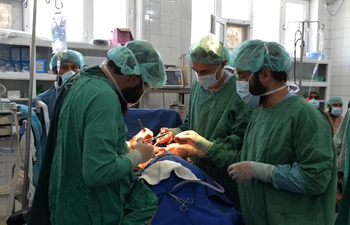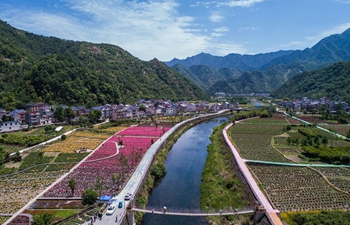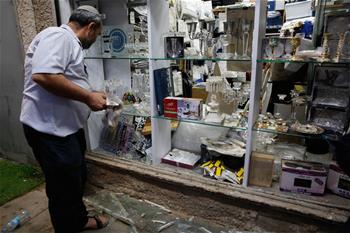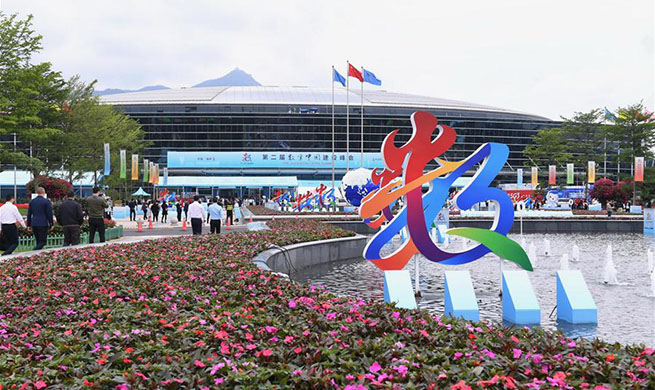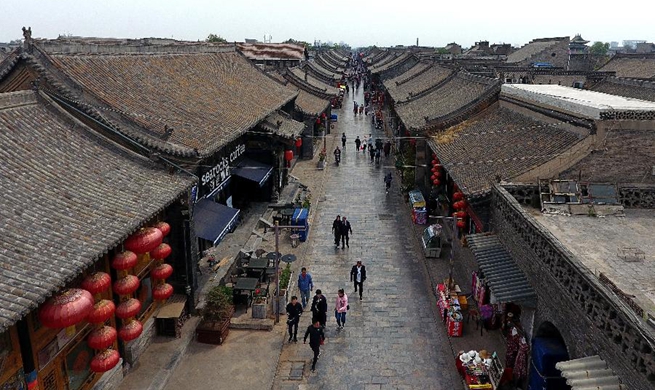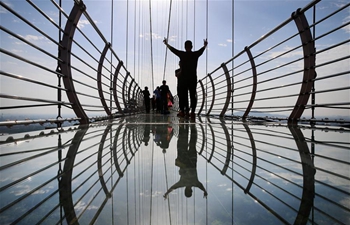LUSAKA, May 7 (Xinhua) -- Chalwa Chiselwa, a 43-year-old resident of Kabeleka, a village located on the outskirts of Zambia's capital Lusaka, is happy with the current infrastructure facilities that she as a child had not benefited from.
"It is amazing to note that one no longer needs to go to the city just to buy simple necessities like a bar of soap or sugar because we now have well-stocked shops in our village. We also have a school and a health facility just within the village, both of which are well serviced with safe water and electricity as well as good roads," she said.
Chalwa, a mother of five is happy that her children, four of them in school, are not facing challenges with regard to accessing education and health care services, which however was not the case with her during her formative years.
"Getting to school was such a chore during my days as a child because we had to walk very long distances. There were no proper roads then; only footpaths. As a result, many children stopped school and this led to a lot of social ills such as early marriages and increased illiteracy levels," she recounted.
She is happy that there is now a government school as well as a health facility in Kabeleka village and that residents have access to safe drinking water, which they get from boreholes instead of shallow wells and rivers infested with disease-causing organisms.
"Life is far much better now. Going to the city is now a matter of choice because we have almost all that we need right here in this village," Chalwa beamed.
According to her, if all rural and remote places in Zambia had access to electricity, safe drinking water and good health, education as well as communication facilities, the number of people trekking to urban areas would reduce significantly because the aforementioned is what attracts many to cities.
Experts assert that investment in infrastructure increases business confidence and draws in investments in other sectors of the economy. It also fosters innovation and productivity and lowers transaction costs, facilitating trade in goods and services as well as skills transfer.
They also note that infrastructure in the form of road and railway transport systems, ports, energy, airports and their efficient working is needed for integration of an economy with other economies of the world.
It has also been observed that for many countries in Africa there still exist gaps in terms of connectivity between rural and urban areas as well as between people and opportunities.
There are also gaps in healthcare, education and sanitation infrastructure in many of the countries on the continent.
Chalwa's narrative in essence demonstrates that infrastructure is important for rapid economic growth and alleviation of poverty. It also shows that infrastructure development is central to inclusive and sustainable development.
"It should be noted that infrastructure development is key to realizing most if not all development goals. Countries that have registered significant economic growth have invested considerably in infrastructure projects," said Caesar Cheelo, a macroeconomics research fellow with Zambia Institute for Policy Analysis and Research (ZIPAR), a Zambian think tank.
Cheelo pointed out that China's huge investments in infrastructure has contributed to its becoming an economic powerhouse today.
According to the African Development Bank (AfDB), the development of infrastructure in Africa is critical for fostering economic growth and improving the living standards of the continent's people. It also contributes significantly to human development, poverty reduction, and the attainment of the Sustainable Development Goals (SDGs).
A recent report by AfDB revealed that investment in infrastructure accounts for over half of the recent improvements in economic growth in Africa and has the potential to contribute even more.
The World Bank also estimated that sub-Saharan Africa's (SSA) GDP per capita growth would increase by 1.7 percentage points per annum if the region were to close the infrastructure gap. This could also make growth in Africa more inclusive, alleviating poverty across the continent.
A recent report by Deloitte indicated that globally, developing countries investing 30 percent of GDP or more on infrastructure and capital equipment have been among the fastest growing economies.
The aforementioned report also indicated that over the past two decades, China has helped to meet some of Africa's infrastructure financing needs and is now the single largest financier of African infrastructure, financing one in five projects and constructing one in three.

